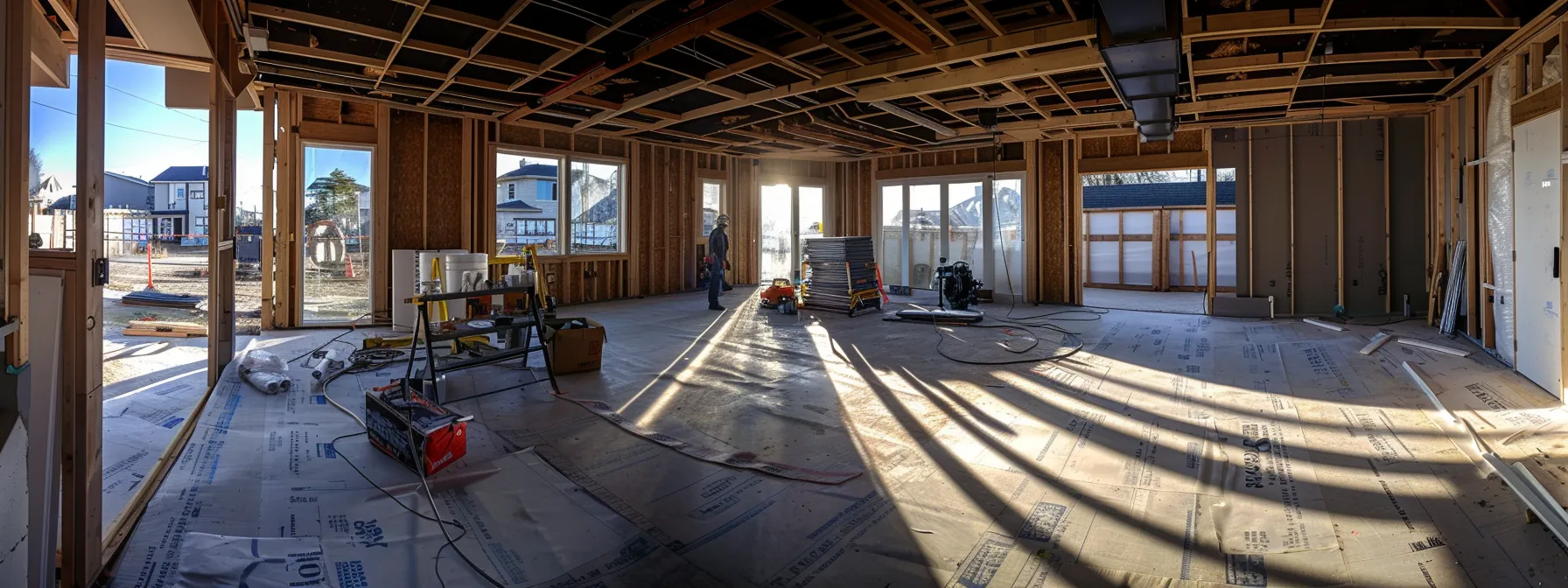In the competitive construction industry, many contractors struggle to stand out online. Did you know that over 90% of online experiences begin with a search engine? This blog post will cover essential SEO strategies to enhance your construction website, optimize local SEO for nearby clients, and show how to implement effective keyword strategies. By […]
In the competitive construction industry, many contractors struggle to stand out online. Did you know that over 90% of online experiences begin with a search engine? This blog post will cover essential SEO strategies to enhance your construction website, optimize local SEO for nearby clients, and show how to implement effective keyword strategies. By applying these strategies, contractors can improve visibility, attract more leads, and outperform competitors. This content aims to help solve the problem of low web traffic and ineffective online advertising, providing clear steps to achieve measurable results in your digital marketing efforts.

To enhance a construction company’s website for better visibility, several key elements must be addressed. Designing a user-friendly interface ensures that visitors navigate effortlessly. Optimizing site speed and ensuring mobile responsiveness improve user experience on various devices. Implementing clear navigation and using high-quality images showcase projects effectively, while updating contact information guarantees client reachability. These strategies contribute to content creation and brand awareness, essential factors in today’s digital landscape.
A user-friendly website interface is essential for a construction company aiming to enhance visibility through effective construction company SEO. This includes simple navigation, which helps potential clients quickly find services offered, project galleries, and contact information. Additionally, maintaining an appealing design with high-quality images of completed projects can significantly boost a company’s reputation and attract attention.
Moreover, integrating tools like Google Business can further improve visibility. When clients can easily interact with the site—whether through intuitive menu options or quick-loading pages—they are more likely to reach out for services, ultimately leading to higher conversion rates. Engaging with a specialized SEO agency can provide tailored insights into current best practices, ensuring the website meets user expectations and ranks well in search results.
Optimizing site speed is crucial for construction companies aiming to enhance their online visibility. Slow loading times can lead to high bounce rates, especially on mobile devices, where quick access to information is often expected. By improving site speed, businesses can ensure that visitors stay on their landing pages longer, increasing the chances of converting them into clients. An efficient SEO company can provide valuable insights into tools and techniques for measuring and enhancing site performance, ensuring that keywords relevant to construction services are highlighted effectively.
A faster website not only improves user experience but also enhances the overall relevance of a construction company’s online presence. When potential clients search for services, they prefer sites that load quickly and function smoothly. This responsiveness plays a significant role in how search engines rank websites. By prioritizing site speed, companies can improve their rankings and drive more organic traffic, leading to greater visibility and growth opportunities in the competitive construction market.
Ensuring mobile responsiveness is essential for construction companies seeking to attract clients who are often on the move. A responsive web design adjusts seamlessly to different screen sizes, providing a consistent user experience whether the visitor is using a smartphone or tablet. This adaptability is particularly vital when utilizing long tail keywords related to home construction, as potential clients increasingly search for services through mobile devices. By optimizing their websites for mobile, businesses can connect with clients in real-time, set appointments, and answer inquiries more effectively.
When a construction company’s website is mobile-friendly, it improves interaction and engagement, which search engines prioritize in their rankings. Quick access to critical information and services enhances user satisfaction and keeps visitors on the page longer, reducing bounce rates. In this competitive industry, investing in mobile optimization can significantly impact visibility and lead generation, ensuring that contractors remain relevant and accessible in a digital landscape where convenience is paramount.
Implementing clear navigation is a key aspect of web design that significantly enhances a construction company’s website visibility. A well-structured table of contents allows customers to effortlessly find relevant information, reducing the bounce rate as visitors stay longer on the site. For instance, including menu options labeled “Services,” “Projects,” and “Contact Us” guides potential clients through the offerings, which aligns with a strong marketing strategy aimed at improving user experience.
When visitors can easily navigate through the site, they are more likely to engage with content, leading to higher conversion rates. Streamlined navigation not only helps customers locate desired services quickly but also builds trust in the company’s professionalism. By ensuring that all critical information is just a click away, construction firms can enhance their overall online presence and encourage prospective customers to reach out without frustration.
Using high-quality images to showcase construction projects can significantly impact lead generation and boost search engine optimization efforts. Professional photos highlight the quality and expertise of completed work, providing a visual testament to the company’s capabilities. When potential clients view attractive images, they are more likely to engage with the website, increasing the chances of conversion and building trust in the brand.
Additionally, integrating these images into a Google Business Profile enhances the company’s online presence and visibility. By including relevant keywords in image descriptions and alt tags, construction businesses can improve their chances of ranking higher in search results. This strategy not only attracts more traffic but also ensures that visitors perceive the company as a leader in the industry, further leveraging the benefits of effective SEO practices.
Updating contact information is essential for construction companies aiming to enhance client reachability and improve visibility in organic search results. Accurate and easily accessible contact details ensure that potential clients can quickly connect with the business, leading to higher engagement and conversion rates. A strategy that includes prominently displayed phone numbers, email addresses, and physical locations on the website can significantly increase user trust and satisfaction, integral for effective construction SEO strategies.
Furthermore, a construction SEO company can assist in performing keyword research to identify how clients search for services, helping firms integrate relevant contact options. Clear and concise contact information not only boosts readability but also aligns with best practices that search engines prioritize. By ensuring all contact points are current and accessible, construction companies can effectively attract more inquiries and foster lasting client relationships.
A strong website captures attention, but it must also draw in the right crowds. To truly connect with clients nearby, focusing on local SEO is key.

To effectively drive growth in construction, local SEO strategies are essential. Contractors should start by claiming and completing their Google My Business profile to enhance visibility on search engine results pages. Incorporating local keywords into content and meta tags, encouraging customer reviews, and adding location-specific pages can bolster trust and improve conversion rate optimization. Additionally, utilizing local directories and participating in community events helps establish a strong brand presence and enhances navigation for potential clients.
Claiming and completing a Google My Business profile is a crucial step for construction companies aiming to enhance their local SEO efforts. This resource allows businesses to provide essential information such as location, hours of operation, and services offered, directly addressing user intent in local search queries. By optimizing this profile, contractors not only increase visibility in search engine marketing but also establish credibility and trust with potential clients who are seeking reliable construction services in their area.
An effective Google My Business profile can significantly influence a construction company’s online presence. By regularly updating content, responding to customer reviews, and posting project images, businesses can engage their audience and drive higher conversion rates. This approach to content marketing not only showcases expertise but also positions the company as a leader within the local market, ultimately making it easier for clients to choose them over competitors.
Incorporating local keywords into content and meta tags is crucial for construction companies looking to improve their search visibility. By using terms related to their specific services, such as “general contractor” alongside local identifiers, businesses can enhance their relevance in local searches. For instance, a contractor in Phoenix might optimize their website with phrases like “best general contractor in Phoenix,” which directly addresses potential clients’ needs while improving local search rankings.
Additionally, utilizing local keywords in email marketing and social media marketing can further engage the target audience. When content reflects the local context, it resonates better with readers. Research shows that homeowners are more likely to connect with contractors who emphasize community ties. Therefore, regularly updating blog posts and social media profiles with localized content not only boosts SEO but also builds trust and familiarity with potential clients.
Encouraging customer reviews is a vital aspect of reputation management for construction companies. Positive feedback builds trust with potential clients, making them more likely to engage services. Companies that actively seek reviews can gather valuable insights through analytics, allowing them to improve their offerings and address any service shortcomings. This feedback strengthens local SEO efforts, as search engines favor businesses with high ratings and numerous reviews, positioning them as credible options in the competitive construction market.
Moreover, integrating customer reviews into the company’s website supports SEO for construction by providing fresh, relevant content that avoids keyword stuffing. When contractors highlight authentic experiences from clients, it not only enhances user engagement but also facilitates link building through shares and recommendations. By showcasing real testimonials, construction firms gain visibility and foster relationships with their community, which can lead to increased inquiries and conversions.
Adding location-specific pages to a construction company’s website significantly enhances local SEO and boosts visibility among the target audience. Each page should focus on different service areas, integrating keywords relevant to those locations, which can improve search engine rankings. By doing this, contractors can drive organic traffic and ultimately increase their revenue as these location-focused pages naturally build backlinks from local directories and community organizations, further enhancing their credibility.
Moreover, these location-specific pages provide potential clients with tailored content that addresses their unique needs, improving user engagement. For instance, highlighting services and showcasing completed projects in specific areas allows contractors to resonate better with visitors. This targeted approach can lead to higher conversion rates, as consumers are likely to choose a company that demonstrates expertise in their locale, reinforcing the effectiveness of engaging Web Design Services that speak to the local community.
Utilizing local directories to list a construction business is an effective strategy for increasing visibility in a specific geographic area. These directories allow contractors to display important information, such as services offered, contact details, and customer reviews. By optimizing these listings with relevant keywords, such as “Search Advertising Services,” businesses can enhance their local SEO efforts and attract clients who are searching for construction services nearby.
Incorporating local directories not only increases exposure but also builds credibility within the community. Many potential clients rely on these platforms to find trusted service providers, making a consistent and accurate presence essential. By regularly updating listings and engaging with customer reviews, construction companies can improve their ranking in local search results, ultimately driving more inquiries and facilitating growth in a competitive market.
Participating in local events is a powerful way for construction companies to increase visibility and engage with the community. By sponsoring or attending trade shows, home expos, and community fairs, contractors can showcase their services and build relationships with potential clients. This direct interaction not only reinforces brand recognition but also helps establish trust, which is essential in a service-driven industry.
Additionally, these events create opportunities to collect customer feedback and insights, guiding contractors in refining their services. For example, setting up a booth at a local home improvement fair allows companies to demonstrate expertise, distribute marketing materials, and offer promotions. By actively engaging in local activities, construction businesses enhance their community presence while boosting local SEO efforts through increased online discussions and mentions of their services.
Local SEO paves the way to new clients. Next, the right keywords will sharpen that path and lift your business in search results.

Effective keyword strategies are essential for construction companies seeking to enhance their online visibility and drive growth. This section covers critical techniques such as conducting keyword research tailored to the construction industry, integrating keywords naturally into website content, and optimizing meta titles and descriptions. Additionally, it emphasizes the importance of using long-tail keywords to reach specific audiences, monitoring keyword performance, and avoiding keyword stuffing to maintain quality content.
Conducting keyword research is a foundational step for construction companies aiming to enhance their online presence and attract more clients. By identifying relevant keywords that potential clients use to search for services, companies can tailor their website content to meet specific needs. For instance, using tools like Google Keyword Planner or SEMrush allows contractors to discover high-traffic keywords such as “local general contractor,” which can drive targeted traffic to their websites.
Moreover, understanding the intent behind search queries can help construction companies align their offerings with what users are seeking. By analyzing search patterns, businesses can identify opportunities to create content that answers common questions or addresses pain points in the industry. For example, a company may find that “affordable home renovation” is a frequently searched term, prompting them to develop a dedicated page showcasing their budget-friendly services. This approach not only improves visibility in search results but also fosters greater engagement with prospective clients.
Integrating keywords naturally into website content is essential for construction companies striving to improve their online visibility. When businesses incorporate relevant keywords, like “residential contractor” or “kitchen remodeling,” they enhance their chances of appearing in search engine results. For instance, when contractors create blog posts that address common client questions, using these keywords seamlessly not only helps target the right audience but also provides valuable information that can convert visitors into customers.
Effective integration of keywords requires a balance between maintaining readability and optimizing for search engines. Construction companies can achieve this by embedding keywords within engaging content that flows naturally, such as in service descriptions or project case studies. This approach allows potential clients to find useful information while also signaling to search engines the relevance of the content, ultimately driving more organic traffic to the site.
Optimizing meta titles and descriptions is a critical strategy for construction companies looking to improve online visibility and attract potential clients. Each meta title should include relevant keywords such as “construction services” or “residential contractors,” ensuring that search engines easily identify the page’s content. By creating compelling and accurate titles, businesses can increase click-through rates from search results, providing a more inviting first impression to users searching for construction-related services.
In addition to meta titles, descriptions play a vital role in capturing user interest. A well-crafted meta description that incorporates keywords and clearly outlines the services offered can significantly influence a visitor’s decision to click on a link. For example, a description for a general contractor might highlight their expertise in home renovations and timely project completion. This approach not only informs users but also enhances search rankings, as search engines favor pages with optimized metadata, directly impacting the business’s growth in a competitive construction market.
Using long-tail keywords effectively can greatly enhance a construction company’s search engine visibility and connect with specific audiences actively seeking their services. These keywords, which typically consist of three or more words, are more targeted than generic ones, allowing contractors to attract clients who have precise needs, such as “custom home builder in Miami” or “eco-friendly renovation services.” By incorporating such phrases into their website content, contractors can increase the likelihood of appearing in relevant search results, ultimately driving more qualified traffic to their sites.
Furthermore, long-tail keywords not only improve positioning in search results but also help businesses align their offerings with client demands. Contractors can analyze search trends to identify phrases that resonate with their target audience, such as queries about “affordable kitchen remodels” or “best roofing options for small homes.” By crafting content that addresses these specific interests, construction companies can build trust with potential clients, demonstrating their expertise and commitment to meeting unique project requirements. This tailored approach is vital for fostering deeper client engagement and increasing conversion rates in a competitive landscape.
Monitoring keyword performance is vital for construction companies aiming to refine their SEO strategies. By utilizing tools such as Google Analytics and SEMrush, contractors can track which keywords drive the most traffic to their websites. This data allows businesses to identify successful keywords and determine areas where adjustments may be needed, ensuring their SEO efforts remain aligned with client searches for services like “home renovations” or “general contracting.”
Adjusting strategies based on keyword performance metrics helps construction companies remain competitive. For example, if a particular long-tail keyword consistently underperforms, it may be beneficial to reallocate resources toward higher-performing keywords or explore related terms that reflect evolving market trends. This proactive approach ensures that contractors can maximize their visibility online, attract potential clients, and ultimately support business growth in the construction industry.
Avoiding keyword stuffing is vital for construction companies that wish to maintain high-quality content while improving their search rankings. Overusing keywords can lead to poor readability, making it difficult for potential clients to engage with the content. Instead, construction firms should focus on integrating relevant keywords naturally, ensuring the text remains informative and user-friendly. This approach not only enhances the user experience but also signals to search engines that the content is valuable, leading to improved SEO performance.
Construction companies can enhance their online presence by providing authentic and engaging content that addresses clients’ specific needs. By prioritizing clarity and relevance over excessive keyword use, contractors can position themselves as trusted authorities in their field. For example, crafting articles that answer common questions can effectively incorporate keywords while fostering a genuine connection with the audience. This balanced strategy ensures that content remains both actionable and informative, ultimately driving higher engagement and conversion rates.
Strong keywords draw visitors in, but words alone won’t close the deal. To truly attract leads, the next step is to create content that speaks to their needs and builds trust.

High-quality content is essential for construction companies looking to attract more leads and drive growth. Creating informative blog posts on relevant construction topics can establish authority while engaging videos showcasing completed projects offer visual appeal. Additionally, publishing case studies highlights expertise, while sharing industry news keeps clients informed. Regularly updated content, paired with optimized images and graphics, ensures ongoing audience engagement and improved SEO performance.
Creating informative blog posts on construction topics serves as a powerful tool for contractors looking to draw in potential clients and establish industry authority. By focusing on relevant subjects, such as home renovation tips or sustainable building practices, construction companies can provide valuable insights that resonate with their audience. This approach not only addresses the specific needs of homeowners but also enhances the website’s SEO by incorporating targeted keywords naturally throughout the content.
Furthermore, well-crafted blog posts can position a construction business as a reliable source of information. For example, a post detailing the advantages of hiring a general contractor can help potential clients understand the complexities of construction projects, encouraging them to seek professional assistance. Regularly updating the blog with practical advice and real-world examples can improve engagement and foster trust, ultimately leading to increased leads and conversions.
Producing engaging videos that showcase completed construction projects can significantly enhance a company’s online presence. High-quality video content not only highlights a contractor’s skills but also provides potential clients with a visual representation of the work quality. This form of content establishes a stronger connection, offering insights that static images may not convey, such as the craftsmanship involved and the overall project aesthetics.
Furthermore, incorporating these videos into a construction company’s digital marketing strategy can improve SEO ranks. By optimizing video titles, descriptions, and tags with relevant keywords like “residential renovation” or “custom home builds,” contractors can increase the visibility of their projects in search results. This strategy not only attracts more traffic but can also convert viewers into clients who are eager to see results that match their vision.
Publishing case studies is an effective method for construction companies to showcase their expertise and attract more leads. These detailed accounts highlight specific projects, illustrating the challenges faced and solutions provided, thus offering potential clients insight into the contractor’s capabilities. By demonstrating successful outcomes, companies create a narrative that communicates their reliability and professionalism, making it easier for prospects to envision their own projects with the contractor.
Additionally, well-crafted case studies improve a company’s online visibility and SEO performance. When they include relevant keywords related to construction services, they enhance organic searchability, driving more traffic to the website. By sharing real-world examples and quantifiable results, such as project completion times and budget adherence, construction firms can build trust with their audience, ultimately converting inquiries into successful projects.
Sharing industry news is a strategic way for construction companies to establish authority and connect with potential clients. By consistently posting updates on market trends, new regulations, or advancements in construction technology, businesses demonstrate their expertise and commitment to the industry. This approach not only engages the audience but also positions the company as a go-to resource for valuable information, enhancing its credibility in a competitive market.
Furthermore, integrating relevant industry news into a content strategy helps improve search engine optimization. By using keywords related to current events and incorporating them into blog posts or social media updates, construction companies can attract more visitors to their websites. This not only drives traffic but can also lead to increased inquiries, as clients are more likely to reach out to businesses that showcase knowledge and insight about their field, fostering trust and encouraging future collaboration.
Regularly updating content is vital for construction companies looking to maintain audience engagement and enhance their search engine ranking. Fresh content signals to search engines that a website is active, which can improve visibility in search results. By revisiting and revising existing blog posts or project case studies, construction firms can ensure that the information remains relevant and provides value to visitors, keeping them informed about industry trends and best practices.
Additionally, incorporating recent project highlights or client testimonials into web pages can make a significant impact. When potential clients see up-to-date examples of work, it builds confidence in the company’s capabilities. Regular updates not only foster a sense of connection with the audience but also encourage repeat visits, ultimately leading to increased inquiries and higher conversion rates as clients recognize the company’s ongoing commitment to quality and expertise in the construction industry.
Optimizing content with relevant images and graphics is essential for construction companies looking to draw in potential clients and enhance their website’s appeal. High-resolution images that showcase completed projects serve as powerful visual testimonials to the quality of work. By integrating these images alongside descriptive captions and relevant keywords, businesses can improve their search engine ranking while providing visitors with engaging content that demonstrates their expertise.
Additionally, utilizing infographics and diagrams can clarify complex information, making it easier for potential clients to understand the services offered. For example, a contractor might use an infographic to illustrate the steps involved in a home renovation project, which can resonate with homeowners seeking guidance. Incorporating such visuals not only boosts user engagement but also helps construction businesses stand out in search results, ultimately driving more qualified leads to the website.
Content alone can draw eyes, but it takes more to build trust. Now, let’s explore how link-building strategies can strengthen your site’s authority and keep those leads coming.

Utilizing link-building strategies is essential for enhancing site authority in the construction industry. Contractors can reach out for guest posting opportunities, collaborate with industry influencers for backlinks, and submit their sites to relevant construction directories. Creating shareable content also attracts natural links, while monitoring and disavowing harmful links protects site reputation, ensuring a strong online presence.
Engaging in guest posting opportunities significantly enhances a construction company’s online presence by fostering valuable backlinks. By collaborating with reputable industry blogs or websites, contractors can share their expertise on relevant topics, such as sustainable building practices or innovative project management techniques. This approach not only drives traffic back to their site but also establishes credibility within the construction community, addressing the needs of potential clients seeking reliable information and services.
To maximize the benefits of guest posting, construction companies should focus on writing insightful and informative content that resonates with the audience of the host site. For instance, a contractor can contribute a detailed article on the benefits of hiring a general contractor to a home improvement blog, which would attract readers interested in remodeling. This strategy not only showcases their knowledge but also builds a network of authoritative backlinks, ultimately improving the site’s SEO performance and helping reach a broader audience.
Collaborating with industry influencers for backlinks is a powerful strategy that construction companies can leverage to enhance their online authority. By building relationships with well-respected figures in the construction field, contractors can secure valuable backlinks to their websites. This not only increases referral traffic but also boosts credibility in the eyes of search engines, which factor link quality into their ranking algorithms. For example, a contractor sharing insights on a popular home improvement blog can attract a broader audience while positioning themselves as a trusted resource.
Additionally, effective collaboration can create opportunities for content co-creation, such as joint webinars or articles, which resonate with both audiences. When influencers share this content on their platforms, they introduce the construction company to their followers, widening its reach and influence significantly. This approach not only helps in acquiring authoritative backlinks but also enhances brand visibility, ultimately contributing to lead generation and growth in the competitive construction industry.
Submitting a construction company’s site to relevant construction directories can significantly enhance its online authority. By listing on these directories, businesses not only increase their visibility to potential clients but also improve their chances of being found in local searches. This practice builds credibility, as many consumers trust information from reputable directory listings when seeking reliable service providers in their area.
Furthermore, these directories often allow companies to include essential details such as services offered, contact information, and customer reviews. This not only aids local SEO efforts but also provides critical insights for potential clients looking to compare options. By optimizing their profiles with targeted keywords, construction firms can attract more organic traffic, making directory submissions an essential component of effective online marketing strategies.
Creating shareable content is a powerful approach for construction companies looking to attract natural links and enhance their online authority. When businesses develop informative articles, engaging videos, or insightful infographics that address common pain points for homeowners, they encourage visitors to share this content on their own platforms. For instance, a construction company could produce a video showcasing the step-by-step process of a kitchen remodel, which not only serves as a valuable resource for potential clients but also motivates viewers to share it with friends and family considering home renovations.
Additionally, shareable content reinforces a construction company’s reputation as an industry expert, making it more likely to earn backlinks from reputable websites. By focusing on creating high-quality, relevant materials that resonate with the target audience, construction firms can cultivate relationships with bloggers and industry influencers who are willing to link back to their content. This strategy not only boosts search engine optimization but also positions the company favorably among competitors, leading to increased visibility and growth opportunities in the construction sector.
Monitoring backlinks for quality and relevance is a critical aspect of maintaining a construction company’s online authority. By regularly evaluating the sources linking to their site, businesses can identify which backlinks contribute positively to their SEO efforts and which may be harmful. For example, a construction firm may discover that a link from a respected industry blog enhances credibility, while a link from a low-quality site could harm search engine rankings.
In practice, using tools like Ahrefs or Moz enables construction companies to assess their backlink profile effectively. By focusing on acquiring high-quality backlinks from reputable sources, such as construction directories or influential blogs, the company can strengthen its online presence. This strategic monitoring helps ensure that the firm’s link-building efforts not only improve site authority but also align with the overall goal of driving growth and attracting more clients in the competitive construction market.
Disavowing harmful links is vital for construction companies aiming to protect their online reputation and maintain strong search engine rankings. When a website accumulates links from low-quality or spammy sources, it risks being penalized by search engines, which can diminish visibility and trust among potential clients. By proactively identifying and disavowing these harmful backlinks, companies can safeguard their reputation, ensuring that only credible, relevant sites connect to their own.
To disavow harmful links effectively, construction firms should regularly review their backlink profiles using tools like Google Search Console or Moz. Once they identify undesirable links, they can submit a disavow file to Google, instructing the search engine to ignore those links in ranking considerations. This practice helps maintain the integrity of the site’s SEO strategy, allowing contractors to focus on building high-quality relationships and connections that genuinely enhance their authority in the competitive construction market.
Link-building is just the start. Next, it’s time to look at the numbers and see how those efforts pay off.

Setting up Google Analytics is essential for construction companies to measure and improve their SEO performance. Tracking key metrics like traffic and bounce rates offers insights into user behavior, helping identify areas for enhancement. Adjusting SEO strategies based on data insights and monitoring competitor performance ensures that firms stay competitive. Regular progress reports to stakeholders reinforce the effectiveness of these efforts.
Setting up Google Analytics on a construction company’s website is a critical step toward measuring and improving SEO performance. This tool provides valuable insights into visitor behavior, allowing contractors to track metrics such as traffic sources, user engagement, and conversion rates. By analyzing this data, they can identify which marketing efforts are driving potential clients and which areas need enhancement.
Moreover, integrating Google Analytics enables construction firms to set specific goals and monitor progress effectively. For instance, by tracking how many visitors fill out contact forms or request quotes, companies can gauge the effectiveness of their calls to action. Such insights empower contractors to refine their strategies, ensuring they address customer needs while optimizing their online presence for better lead generation and growth in the competitive construction market.
Tracking key metrics like traffic and bounce rates provides construction companies with essential insights into their website performance and user engagement. Analyzing traffic sources helps businesses understand where visitors are coming from, whether through organic search, social media, or referrals. For instance, a sudden spike in traffic following a marketing campaign indicates the effectiveness of that strategy, enabling the company to allocate resources more wisely to enhance growth.
Bounce rates, which reflect the percentage of visitors leaving the site without further interaction, can highlight potential issues with content or site usability. High bounce rates may suggest that the website fails to meet visitor expectations or lacks relevant information, indicating a need for improvement. By focusing on reducing bounce rates, construction companies can create a more engaging user experience, ultimately driving conversions and fostering long-term client relationships.
Analyzing user behavior on a construction company’s website provides essential insights for enhancing SEO performance. By tracking metrics such as page views, time spent on pages, and user flow, contractors can identify which content resonates most with visitors. For example, if a specific service page is receiving high traffic but has a high bounce rate, this may indicate that the content does not meet visitor expectations or lacks sufficient detail. Understanding these patterns allows construction companies to make targeted improvements, enhancing user engagement and conversion rates.
Moreover, analyzing user behavior helps construction companies refine their marketing strategies based on real-world interactions. Tools like Google Analytics provide data on how visitors navigate the site, revealing potential roadblocks or information gaps. For instance, if users are consistently dropping off at the contact page, it may suggest that the form is too lengthy or complex. By addressing these specific issues, construction firms can create a more user-friendly experience that not only attracts visitors but also encourages them to take action, ultimately supporting business growth through improved leads and customer satisfaction.
Adjusting SEO strategies based on data insights is essential for construction companies looking to optimize their online visibility. By utilizing tools like Google Analytics, contractors can track specific metrics such as keyword performance and user engagement, allowing them to identify which aspects of their website need improvement. For instance, if certain pages receive high traffic but low conversion rates, this signals an opportunity to refine the content or calls-to-action on those pages to better meet user needs.
Furthermore, regular analysis of performance data enables construction companies to respond swiftly to market trends and shifting consumer behavior. If analytics show an increase in searches for specific services, such as eco-friendly construction options, contractors can prioritize content that highlights these offerings. This proactive approach not only enhances relevance but also positions the company to attract a growing audience actively seeking these services, ultimately driving growth in a competitive construction market.
Monitoring competitor performance is an essential practice for construction companies aiming to enhance their SEO strategies. By analyzing competitors’ websites, firms can identify successful keywords, content themes, and marketing tactics that resonate with their target audience. For instance, observing the service offerings and online presence of similarly positioned construction businesses can provide valuable insights into effective SEO approaches and areas for improvement.
Additionally, benchmarking against competitors allows construction companies to establish realistic performance goals. By tracking metrics such as website traffic, bounce rates, and conversion rates, contractors can evaluate their efforts against industry standards and adjust their strategies accordingly. This proactive approach not only fosters a better understanding of market dynamics but also helps construction firms remain competitive in attracting potential clients and driving growth.
Regularly reporting progress to stakeholders is essential for construction companies seeking to improve their SEO performance. By sharing data-driven insights on key metrics, such as website traffic and conversion rates, stakeholders gain a clear understanding of how SEO strategies are impacting business growth. This transparency fosters trust and allows for informed decision-making to adapt marketing approaches based on actual results.
Effective communication of progress can also highlight areas needing improvement or adjustment. For example, if analytics show declining traffic from specific keywords, stakeholders can initiate discussions to refine strategies targeting those areas. By ensuring stakeholders are informed, construction companies can align their goals with SEO efforts, creating a cohesive approach that drives growth in a competitive market.
Driving growth in construction through effective SEO strategies is essential for contractors aiming to enhance their online visibility and attract more clients. By optimizing website elements, utilizing local SEO tactics, and producing high-quality content, construction companies can improve their search rankings and engage potential clients. Additionally, monitoring performance and adjusting strategies based on data insights ensures continued relevance in a competitive market. Embracing these practices not only fosters business growth but also solidifies a company’s position as a trusted leader in the construction industry.
Ready to implement these SEO strategies? Start with an SEO-ready construction website that’s built for growth.
During the Smart Site AI Consultation we will: